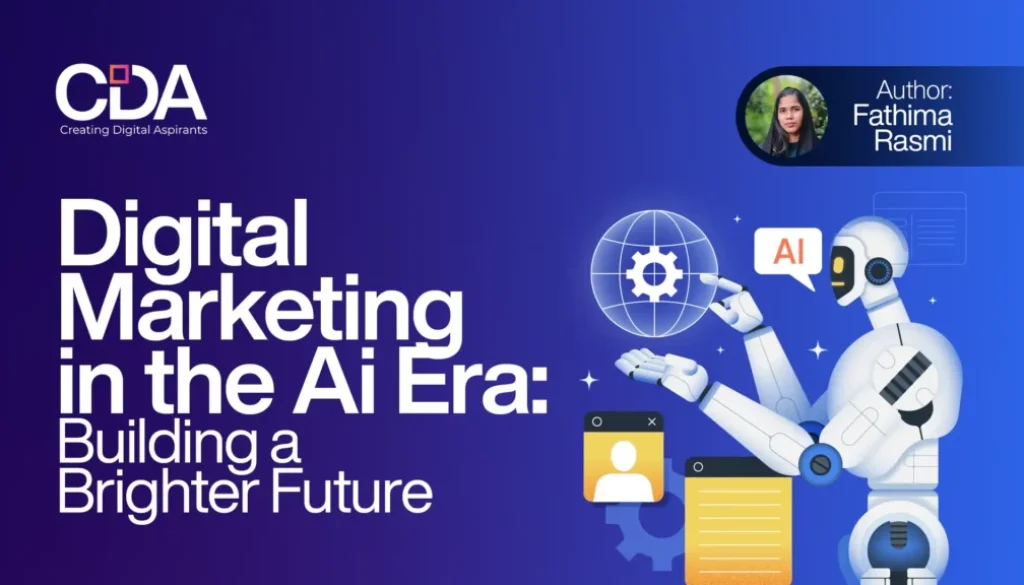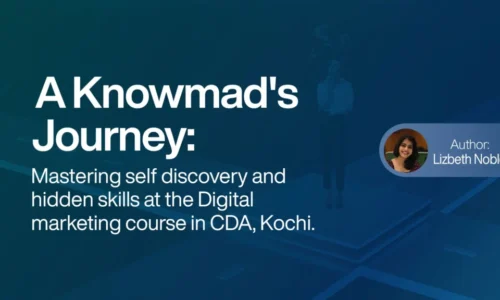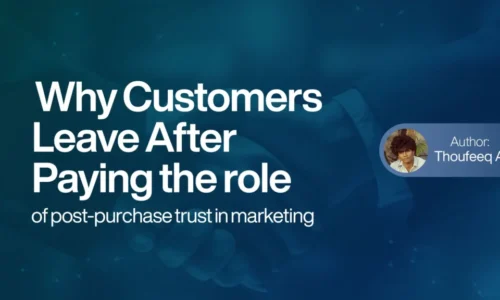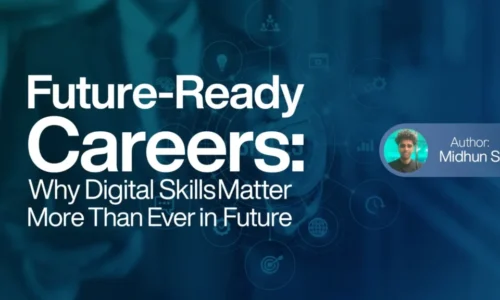Digital Marketing in the AI Era: Building a Brighter Future
In a rapidly morphing digital marketing landscape, Artificial Intelligence (AI) is turning out to be a game-changer. The way businesses connect with their audiences, analyse data and optimise campaigns is being shaped by AI technologies. This article will examine how AI fits into digital marketing and provide tips for marketers on how they can leverage these technologies to stay ahead.
Table of Contents

What is digital marketing?
Online advertising, also known as digital marketing, involves a series of interactive activities that are aimed at promoting brands. It is the promotion of brands through online methods that connects brands to potential customers. As part of the promotional mix, this includes direct selling via electronic mail (e-mail), social media sites, and internet ads as well as mobile messages and multimedia messages. The use of digital devices and technology to market products or services is called digital marketing. That means in simple terms any kind of marketing done via cell phones, laptops, net etc., is known as Digital Marketing. Digital Marketing simply means leveraging available technologies to advertise goods or services through the internet. The term “digital media” encompasses text, graphics, pictures, videos among others. Digital Marketing refers to a variety of techniques adopted by businesses to promote their products and services through online platforms. This can be achieved using platforms such as:
- Social Media Platforms – Social media platforms refer to online platforms and tools that allow people to create, share and exchange information and content with other people. E.g.- Twitter; LinkedIn; Instagram; Facebook; WhatsApp, etc.
- Search Engines – search engine is a software program aiding users to find information on the web by use of keywords or phrases. E.g.- Google, Yahoo!, YouTube, Bing, Internet Archive, etc.
- Email – Short form for electronic mail is E-mail. A digital communication system that transmits messages between computer networks through electronic devices is known as e-mail. The term contains technology as well as the individual messages exchanged. E.g. Gmail (Google’s mail service is called Gmail), Hotmail (Hotmail is an email service offered by Microsoft)
Digital marketing refers to the promotion of goods or services through digital channels that can be accessed via computers or mobiles. It involves a huge range of strategies from complex automated email campaigns to simple blog content and uses both online and offline digital technologies.
What is AI?
Artificial Intelligence (AI) refers to technology that enables machines to perform tasks that typically require human intelligence, such as learning from data, understanding language, and recognizing patterns. In digital marketing, AI is a game-changer because it helps businesses automate and optimise their strategies. AI-driven tools can analyse vast amounts of data to predict consumer behaviour, personalise content, and enhance targeting in ads. For example, AI can power chatbots that provide instant customer support, recommend products based on user preferences, and analyse social media trends to craft better marketing strategies. By leveraging AI, digital marketers can make more informed decisions, improve campaign performance, and connect with their audience more effectively.
The Role of AI in Digital Marketing
- Better decision-making through improved data analysis and insights.
- Scaling up user experiences using personalization.
- Automation of repetitive tasks like email marketing or managing social media.
The Irreplaceable Role of Human Creativity
Despite AI’s effectiveness in helping digital marketing, its role remains irreplaceable in an AI-driven world. Successful campaigns depend on the teamwork of humans and AI technology, so they must work seamlessly together. In this regard, AI works as a co-pilot, taking up data-intensive tasks while allowing humans to focus on strategic and creative sides of their business. With regards to Augmented Intelligence, it is possible for Analytical tools and suggestions can be made by both people and computers in collaboration with each other. Nonetheless, when we think about strategy development processes, this human creativity is irreplaceable since marketing professionals generate novel ideas about sales strategies and ways how to analyse and interpret information different from artificial intelligence (AI). Nevertheless, emotional intelligence which helps create powerful brand affiliations plus customer empathy eludes AI. Moreover, AI’s advancement requires ethical decision making that aligns with established ethics through human oversight. Thus, the success of digital marketing depends on combining the efficiency of AIs with the unique contributions from human insight that creates relationships.
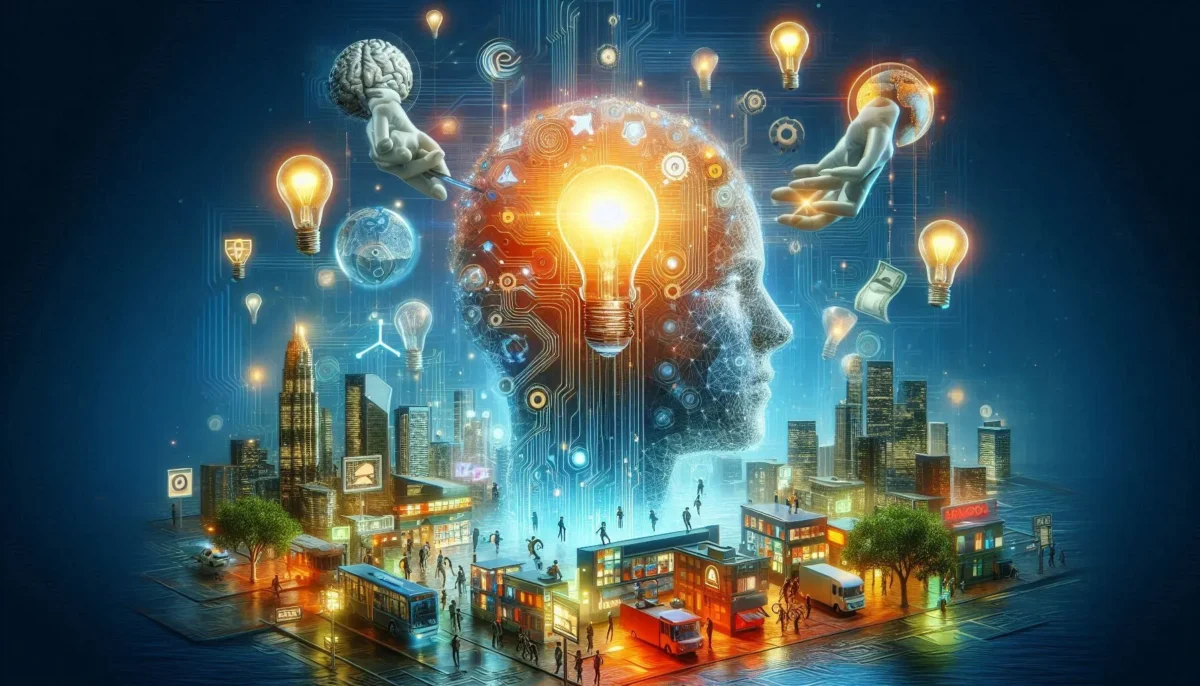
Future Trends in AI and Digital Marketing
Emerging AI Technologies
1. What is to come including advanced natural language processing innovations as well as creative AI mechanisms?
Creative Content Generation: AI will help create things like art, music, and stories, and might even come up with original content on its own.
Personalization: AI will personalise interactions more based on your preferences and past interactions.
Combining Data: AI will merge text with images and sounds, so it can give richer and more relevant responses.
Better Understanding: AI will get much better at picking up on the subtleties and context in conversations, making interactions feel more natural.
2. How will these technologies change digital marketing?
These advancements will revolutionise digital marketing by making it more personalised and effective. AI will create highly tailored ads based on individual preferences, improve customer interactions with smarter chatbots, and generate creative content like ads and social media posts more efficiently. Overall, marketing campaigns will become more targeted and engaging, leading to better results and stronger connections with audiences.
The Evolving Role of Marketers
- From old-fashioned marketers to those that are knowledgeable on artificial intelligence insights and strategies.
- Preparing for the future: skills and knowledge marketers need to thrive in the AI era.
Tools and Technologies Powered By AI
Chatbots & Virtual Assistants
- Real-time customer support services that chatbots offer as well as personalised recommendations by them.
- Successful implementations that have impacted customer engagement will also be discussed by this paper using examples.
Predictive Analytics
- AI for predicting trends and consumer behaviour before it happens.
- Case studies showing how predictive analytics has improved marketing strategies.
Content generation and curation
- Artificial intelligence tools for generating ideas, writing assistance, and optimising content.
- How AI can improve content curation to suit user preferences and activities.
Programmatic Advertising
- Definition of Programmatic advertising and its advantages.
- How does AI make targeting and bidding more effective in ads?
Challenges and Considerations
Data Privacy Concerns
- Using AI tools without breaching data privacy regulations, for instance, GDPR.
- AI transparency and ethical concerns in marketing.
Integration and Costs
- Problems of incorporating AI products into existing marketing systems.
- Estimating the costs versus benefits of AI technology adoption.
Skill Requirements
- Marketers necessity to learn more about the programs they use daily (AI-based ones).
- The digital marketer’s knowledge base: resources available for training purposes.
Conclusion
Digital marketers are faced with opportunities and challenges related to the age of artificial intelligence. By understanding this technology, embracing it, marketers can improve their strategies, provide individualised experiences, and make informed decisions based on relevant data. To be effective with these systems within a highly dynamic market place it is important to keep up with what these technologies have in store by being adaptable. the future of digital marketing lies in a harmonious collaboration between humans and AI. By understanding the strengths and limitations of both, businesses can create powerful and effective marketing campaigns that drive results.
Author Info
Fathima Rasmi, A Freelance Digital Marketer in Thrissur
Learner of CDA Online Digital Marketing Courses
